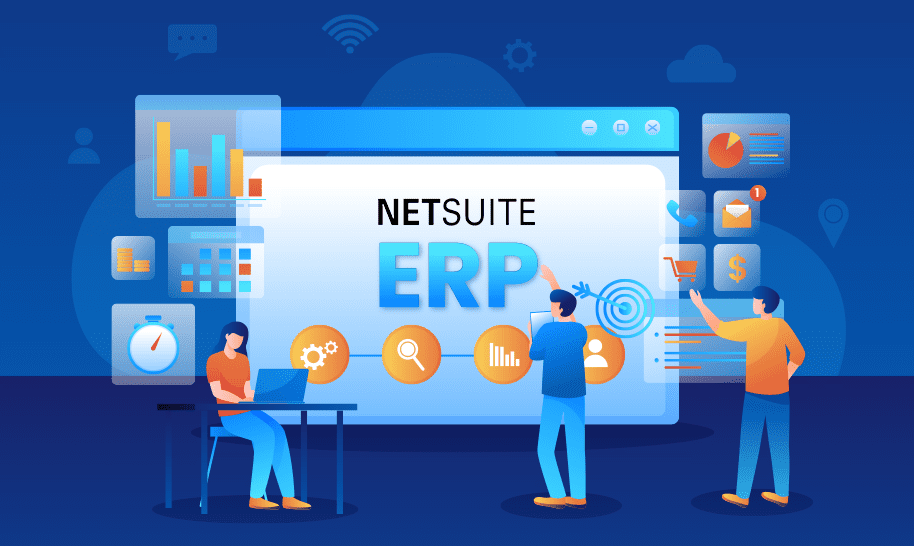Introduction
In the rapidly evolving landscape of business technology, Enterprise Resource Planning (ERP) systems have become essential for streamlining business operations. Among these systems, NetSuite ERP stands out for its versatility and comprehensive features. This guide delves into the intricacies of implementing NetSuite ERP, offering insights into its functionalities, benefits, and the steps necessary for a successful deployment.
What is NetSuite ERP?
NetSuite ERP is a comprehensive, cloud-based business management solution that integrates key business functions into a single system. It’s designed by Oracle to provide businesses with an all-encompassing tool for managing financials, supply chain, operations, reporting, manufacturing, and human resource activities. Its cloud-based nature ensures flexibility and scalability, making it an excellent choice for businesses looking to grow and adapt in dynamic markets.
Key Features of NetSuite ERP
- Financial Management: NetSuite provides a complete suite of financial tools designed to manage and streamline your financial operations. It includes advanced capabilities for general ledger, accounts receivable, and accounts payable, helping businesses manage their cash flows more effectively.
- Supply Chain and Inventory Management: This feature enables efficient tracking and management of supply chain activities. It helps businesses optimize inventory levels, reduce costs, and improve customer satisfaction through better supply chain management and real-time inventory tracking.
- Customer Relationship Management (CRM): NetSuite’s integrated CRM module aids in managing customer interactions, improving customer service, and enhancing sales performance. It provides a 360-degree view of the customers, aiding in better understanding and meeting their needs.
- E-commerce Capabilities: The platform’s e-commerce integration facilitates seamless management of online sales. This feature helps businesses manage their web presence and online sales activities, providing a unified platform for both front-end e-commerce and back-end business operations.
- Human Resources Management: It offers comprehensive tools for managing the human resources aspect of your business. This includes payroll, talent acquisition, and performance management, helping to streamline HR processes and improve employee engagement.
Benefits of Implementing NetSuite ERP
NetSuite ERP significantly enhances business efficiency and decision-making capabilities. By automating business processes, it substantially reduces manual workload and errors, thereby streamlining operations across various departments. This results in notable time and cost savings for the organization. Additionally, NetSuite’s provision of real-time data and analytics offers deep insights into business operations. This feature is crucial for making more informed, data-driven decisions, further enhancing the operational efficiency and strategic planning of a business.
The scalability, cost-effectiveness, and global accessibility of NetSuite ERP make it an ideal solution for growing and diversifying businesses. Its modular nature fits perfectly with the evolving needs of expanding companies, ensuring that you can add on different modules as needed. NetSuite OneWorld also allows companies to seamlessly add new entities and subsidiaries as they grow, meaning the system can scale with your expanding business. The cloud-based model of NetSuite minimizes the need for extensive IT infrastructure and maintenance, translating into significant cost reductions. Furthermore, the cloud-based architecture allows for global accessibility, making NetSuite an optimal choice for businesses with multiple locations or remote teams, ensuring seamless operation and management irrespective of geographical boundaries. For more information on licensing, check out this complete guide to NetSuite pricing.
Steps for Successful Implementation
- Assess Your Needs: Begin by understanding your business’s unique processes and requirements. This assessment will guide the customization and setup of NetSuite to align with your specific business needs.
- Choose the Right Partner: Selecting a knowledgeable and experienced NetSuite implementation partner is crucial for a smooth transition. The right partner will provide invaluable insights and support throughout the implementation process.
- Plan and Design: Create a comprehensive implementation plan that outlines the project scope, timelines, budget, and resource allocation. This plan will serve as a roadmap, guiding the entire implementation process.
- Customization and Integration: Tailor NetSuite to fit your specific business requirements. This step involves customizing the software and integrating it with other systems in your business for seamless operation.
- Data Migration: Migrating data to NetSuite is a critical step that needs careful planning and execution. It involves transferring existing business data to the new system while ensuring data integrity and accuracy.
- Training and Testing: Provide thorough training to all users to ensure they are comfortable with the new system. Conduct extensive testing to identify and rectify any issues before going live.
- Go-Live and Support: Once everything is set, launch the system. Post-launch, ensure continuous support is available to address any issues and to facilitate any necessary updates or changes.
Conclusion
Implementing NetSuite ERP is a strategic move for businesses aiming for streamlined operations and growth. The system’s extensive features and scalability make it a robust choice for diverse business processes. However, the key to successful implementation lies in detailed planning, effective customization, and consistent support. Understanding these aspects and preparing accordingly will enable businesses to fully leverage the benefits of NetSuite ERP.



































